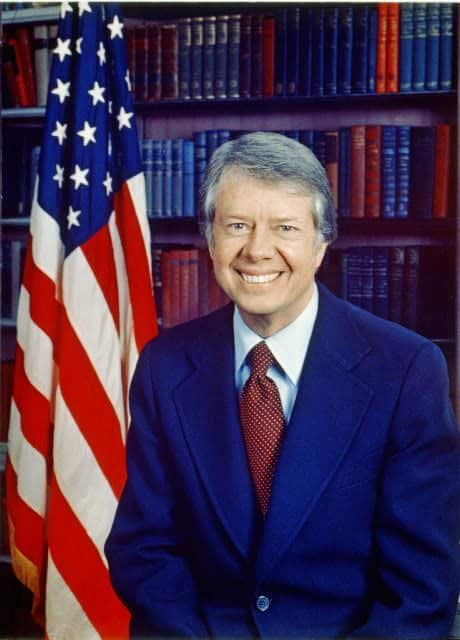Honoring a Great Leader
Today, as we gather in reflection, we remember Jimmy Carter, a remarkable figure whose contributions have left an indelible mark on history. Throughout his life, he demonstrated an unwavering commitment to public service and a deep compassion for humanity. Having served as the 39th President of the United States, Carter’s tenure was marked by both significant foreign policy achievements and impactful domestic initiatives that paved the way for future progress.
Carter’s vision of a peaceful world was not merely a rhetorical aspiration; it was a guiding principle of his administration. His efforts in brokering peace agreements, most notably the Camp David Accords, highlighted his dedication to resolving conflicts through dialogue and diplomacy. This legacy of promoting peace continued long after his presidency, as he devoted his post-presidential years to humanitarian endeavors, reinforcing his status as a global ambassador for peace. It is fitting to honor a leader who genuinely believed in the power of kindness and understanding in bridging divides.
Moreover, Carter’s initiatives directed towards poverty alleviation, health care improvement, and human rights advocacy resonate deeply in today’s society. His work with Habitat for Humanity reflects not only his commitment to aiding the less fortunate but also his belief in the empowerment of individuals to help themselves through community involvement. As we reflect on these meaningful contributions, we recognize the values of empathy and service that he championed throughout his life, which serve as a guiding light for future generations. Today, as we mourn the loss of this great leader who passed away today, we also celebrate his life and unwavering dedication to making the world a better place.
The Roots of a Leader
Jimmy Carter, born on October 1, 1924, in Plains, Georgia, grew up in a modest but nurturing environment that greatly influenced his character and values. He was the eldest of four children in a family that emphasized hard work, education, and community involvement. His father was a successful peanut farmer, and his mother was a registered nurse, creating a household atmosphere where both agriculture and public service played significant roles in their daily life.
From an early age, Carter was exposed to the intricacies of rural life, spending countless hours working on the family farm. This upbringing instilled a strong work ethic and a profound sense of responsibility in him. Carter’s parents encouraged an attitude of self-reliance and integrity, values that would later become cornerstones of his leadership style. His mother, in particular, had a significant impact, teaching him the importance of compassion and helping those in need, traits that would define his approach to governance.
Education was also a priority in the Carter household. He attended the local public school where he developed a love for reading and learning. Carter’s early experiences in school, coupled with his exposure to diverse perspectives within his community, broadened his horizons. The influence of his teachers, who recognized his potential and encouraged his academic pursuits, contributed to his eventual enrollment at the United States Naval Academy in 1943.
Furthermore, his early exposure to the challenges and dynamics of the American South during a time of segregation and economic disparity left an indelible mark on him. These formative experiences molded an emerging leader who would later demonstrate a lifelong commitment to public service and social justice. Jimmy Carter’s early life was not just the backdrop of his upbringing but the foundation upon which he would build a legacy of compassion and diplomacy, which resonates even after his passing today.
A Commitment to Duty
Jimmy Carter’s early life was marked by a strong sense of duty and commitment, which was further solidified during his military service in the United States Navy. Carter attended the United States Naval Academy, where he demonstrated not only academic prowess but also leadership qualities that would serve him well in his future endeavors. Graduating in 1946, he was commissioned as an ensign and soon began his naval career aboard the submarine USS Pomfret. His time in the submarine service was characterized by diligence and responsibility, traits that were evident to both his peers and superiors.
During the later years of his military service, particularly while stationed in the Pacific, Carter faced challenges that honed his decision-making and crisis management skills. He navigated the intricacies of military operations, which provided him with a foundation in strategic thinking and personnel management. These experiences would be pivotal when he transitioned to civilian life following his service in the Navy.
The combination of military discipline, agricultural experience, and a strong ethical foundation laid the groundwork for Jimmy Carter’s later pursuits in politics, ultimately leading to a presidency defined by a push for peace and service. These formative years were essential in molding a leader who would champion public interests and human rights comprehensively.
From School Board to President
Jimmy Carter’s political journey began in the 1960s when he transitioned from a successful peanut farmer and businessman in Plains, Georgia, to a public servant. His entry into politics was marked by an unwavering commitment to service and community, evolving from serving on the school board to becoming a state senator. Carter’s early experiences shaped his worldview, emphasizing integrity and the importance of government as a tool for social change.
In 1970, he was elected as the Governor of Georgia, where he implemented several progressive reforms. His tenure was characterized by a focus on improving education, welfare, and the criminal justice system. Carter’s approach as governor was innovative; he famously sought to reduce racial segregation and enhance transparency in government operations. These policies not only endeared him to the citizens of Georgia but also established a solid foundation for his political aspirations. He overcame numerous challenges, such as budget constraints and political opposition, to leave a mark on state governance.
The culmination of his political career in the state led to his presidential campaign in 1976. Running as the Democratic nominee, Carter’s campaign strategy hinged on his outsider status and commitment to ethics, resonating with an electorate weary of the Watergate scandal and disillusioned by political corruption. His victory against incumbent Gerald Ford not only made him the 39th President of the United States but also positioned him as a beacon of hope for renewal and integrity in American politics.
Carter faced a myriad of challenges during his presidency, including economic turbulence, energy crises, and international conflicts. Despite these hurdles, his dedication to peace and humanitarian efforts remained a hallmark of his administration, further solidifying his legacy long after public service. As we reflect on the life of Jimmy Carter, who passed away today, his remarkable transition from governor to president illustrates a journey rooted in profound commitment to public service.
Achievements and Challenges
Jimmy Carter’s presidency, which spanned from January 20, 1977, to January 20, 1981, was marked by significant achievements as well as considerable challenges. One of his most notable accomplishments was the Camp David Accords, a historic peace agreement between Egypt and Israel. This agreement not only served as a blueprint for future peace efforts in the Middle East but also showcased Carter’s commitment to diplomacy and conflict resolution. His ability to bring these two nations together highlighted his skills as a negotiator and his dedication to achieving lasting peace.
In addition to his foreign policy successes, Carter prioritized energy conservation during a time of rising fuel prices and oil shortages. His administration implemented policies aimed at reducing America’s dependency on foreign oil, promoting renewable energy sources, and encouraging conservation among citizens. The establishment of the Department of Energy signified a long-term commitment to addressing energy needs and enhancing national security through energy independence.
Moreover, Carter was a strong advocate for human rights on a global scale. He believed that the United States should champion these values in its foreign policy, which led to a reevaluation of relationships with countries that were known for human rights violations. This commitment to human rights was both praised and criticized, as it sometimes contradicted strategic interests of the United States.
However, Carter’s presidency was not without its challenges. The Iran Hostage Crisis, where 52 American citizens were taken hostage in Tehran, overshadowed much of his final term. This incident, coupled with inflation and unemployment rates rising sharply during the late 1970s, led to a perception of ineffectiveness among many voters. Despite these difficulties, Jimmy Carter’s presidency ultimately left a legacy that emphasized the importance of peace, human rights, and energy conservation. His efforts continue to resonate, especially as the nation reflects on his life now that he has passed away today.
Nobel Peace Prize
In 2002, Jimmy Carter was awarded the Nobel Peace Prize, a significant recognition that underscored his lifelong dedication to promoting peace and human rights across the globe. This esteemed accolade not only celebrated his efforts during his presidency but also highlighted his impactful work in the years that followed, particularly through the Carter Center. The Nobel Committee acknowledged Carter’s commitment to resolving conflicts, advancing democracy, and improving global health, marking him as an advocate for humanitarian efforts on a worldwide scale.
Following his presidency, Jimmy Carter became a pivotal figure in international diplomacy through the Carter Center, an organization he co-founded in 1982. This institution was instrumental in addressing a variety of pressing global issues, such as disease eradication, conflict resolution, and the promotion of fair elections. Under his leadership, the Carter Center facilitated negotiations in various conflict zones, demonstrating his belief that dialogue and understanding could lead to lasting peace. His commitment extended to advocating for the rights of women and marginalized communities worldwide, reflecting his belief in the fundamental rights of all individuals.
Carter’s influence was not limited to immediate humanitarian efforts; he also focused on long-term solutions that addressed the root causes of conflict and poverty. The Center’s initiatives have had a profound impact on international diplomacy, fostering cooperation among nations and encouraging democratic transitions in regions experiencing turmoil. Even as the world reflects on the news of his passing today, it is vital to recognize how Jimmy Carter’s legacy continues to shape our understanding of peace and conflict resolution. His contributions remind us that the pursuit of peace is a continuous journey, requiring unwavering commitment and action from leaders and citizens alike.
Building Homes and Hope
The late Jimmy Carter, who passed away today, is perhaps equally celebrated for his humanitarian efforts as he is for his political contributions. Among the various initiatives he championed, his long-standing relationship with Habitat for Humanity stands out as a testament to his profound commitment to service and community welfare. Carter’s engagement with Habitat for Humanity began in the late 1980s and evolved into a personal mission that he embraced with fervor.
As a former President of the United States, Carter utilized his platform to bring attention to the plight of those living in substandard housing. He not only advocated for housing reform but also took an active role in building homes for marginalized communities. This hands-on involvement demonstrated his belief that everyone deserves access to safe and affordable housing. Alongside his wife, Rosalynn Carter, he volunteered countless hours at various builds across the country, which became a signature part of their post-presidential life.
Carter’s work with Habitat for Humanity encapsulates the core of his legacy—fostering hope and enhancing the quality of life for those in need. His commitment went beyond just physical construction; he sought to empower families and uplift communities, demonstrating the importance of solidarity and service. Each nail hammered and each wall raised symbolized not only a home built but also a life transformed. The model of community partnership that Habitat promotes aligned perfectly with Carter’s vision of a compassionate society where everyone contributes to the greater good.
Jimmy Carter’s dedication to Habitat for Humanity is a noteworthy highlight of his post-presidential life, reinforcing his enduring commitment to serve others and work towards social justice. As we reflect on his legacy, it becomes clear that his contributions to this organization have had a lasting impact on countless families and communities across the nation.
A Model of Grace and Activism
After serving as the 39th President of the United States from 1977 to 1981, Jimmy Carter transitioned into a remarkable later life characterized by profound humility and relentless advocacy. Rather than retreating into obscurity, he dedicated his post-presidency years to improving global health, promoting education, and addressing social justice issues. Throughout his journey, Carter’s unwavering commitment to humanitarian efforts has made him a distinguished figure in modern history.
Carter’s involvement with the Carter Center, founded in 1982, has been pivotal in promoting health initiatives and disease eradication in developing countries. The center has made significant strides in combating diseases such as Guinea worm disease, which Carter famously vowed to eliminate during his retirement years. His efforts contributed to a drastic reduction in the prevalence of the disease, showcasing both his tenacity and the effectiveness of grassroots solutions. This work significantly reinforced Carter’s image as a leader devoted to the welfare of others, embodying the idea that meaningful change can stem from humble beginnings.
Moreover, Jimmy Carter’s emphasis on education has been a cornerstone of his later life legacy. He has tirelessly advocated for education reform, focusing on literacy and accessible learning opportunities for children worldwide. This endeavor reflects his belief that education is a fundamental right and a powerful catalyst for social change. His dedication to these causes, coupled with his frequent public speaking engagements, has allowed him to inspire countless individuals to participate in social justice initiatives, thereby fostering a generation committed to advocacy.
In essence, the legacy of Jimmy Carter, who passed away today, exemplifies the potential for positive impact through kindness and action. His post-presidential life serves as a testament to the enduring influence of service, illustrating that true leadership persists beyond the confines of political office.
A Lasting Impact on Humanity
Jimmy Carter, the 39th President of the United States, passed away today, leaving behind a profound and lasting legacy that transcends the realms of politics and governance. His unwavering commitment to human rights, peace, and community service continues to inspire future generations. Throughout his life, Carter emphasized the importance of compassion as a cornerstone of effective leadership, teaching us that true strength lies in understanding and serving others.
From his time in office to his post-presidency endeavors, he consistently advocated for the most vulnerable populations, illustrating the idea that every individual has inherent value. Carter’s initiatives in global health and humanitarian aid not only demonstrated his passion for service but also established frameworks that continue to guide organizations dedicated to uplifting those in need. Through the establishment of The Carter Center, he provided a platform that emphasizes democratic governance, public health, and conflict resolution, reinforcing his belief that peace can be achieved through dialogue and mutual understanding.
In addition to his humanitarian work, Jimmy Carter’s teachings about community service resonate deeply. He urged individuals to engage actively in their communities and to view service as both a privilege and a responsibility. This philosophy inspired countless individuals to follow in his footsteps and seek ways to improve their neighborhoods, fostering a culture of cooperation and compassion. The lessons drawn from his life highlight the significance of empathy and the active participation of citizens in promoting justice, equality, and peace.
The legacy of Jimmy Carter is not simply about the political achievements during his presidency but encompasses a broader impact on humanitarianism and global peace. As we honor his memory, we are reminded of the values he stood for and the imperative to carry forth his teachings, ensuring that his vision for a more compassionate world lives on through our actions and commitments. His impact will endure, challenging us to aspire to higher ideals and to serve humanity with dedication and love.



